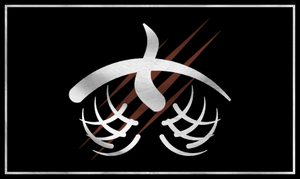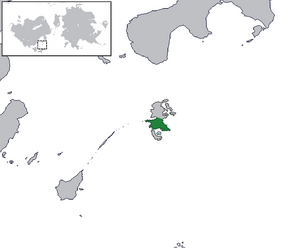The Garou-Nation
This article is incomplete because it is pending further input from participants, or it is a work-in-progress by one author. Please comment on this article's talk page to share your input, comments and questions. Note: To contribute to this article, you may need to seek help from the author(s) of this page. |
The Great Garou-Nation of the Second Concordiat | |
|---|---|
|
Flag | |
| Motto: Serve Gaia above all else. | |
| Anthem: The Invocation | |
| Capital and largest city | Tamaravil |
| Official languages | English High Tongue |
| Recognised regional languages | Greek Irish Scottish Gaelic Norwegian German Arabic Russian Cherokee Lhasa Tibetan Pictish |
| Demonym(s) | Garou |
| Government | Unstructured parliamentary legislature |
• High King | Jonas Albrecht |
| Legislature | Silver Council |
| Formation | |
• First Concord | 1000 |
• Second Concord | 1000 |
| Population | |
• Estimate | 1,000,237 |
| Gini | 11.0 low |
| HDI | 0.622 medium |
| Currency | Talen (GTA) |
| Date format | AAA/yyyy/mm/dd |
| Driving side | left |
| Calling code | +992 |
| ISO 3166 code | TGN |
| Internet TLD | .gwn |
The Garou Nation ([ðə ɡəˈɹu ˈneɪʃᵊn]), officially The Great Garou Nation of the Second Concordiat, is a country in southwestern Sparkalia, off the southeastern coast of the Pythian mainland. The Garou Nation is known for its relatively unspoilt natural beauty and laissez-faire approach to government. The Garou Nation was formed as a coalescence of several tribes and movements in a short space of time as a result of the signing of the Second Concordiat.
Etymology
"Garou" is derived from French loup-garou, itself derived from Old French leu garoul.
History
Geography and natural history
Economy
Transport
Education
Demography
Culture
Politics
The Garou-Nation is an unstructured bicameral parliamentary legislature operating under a modified Westminster System. The Garou-Nation is split into 101 "bawns", which act as parliamentary constituencies. The Garou-Nation is famed for having an unstructured voting procedure, allowing for voting methods to be determined on a bawn-by-bawn level. There are no term limits present, although it is convention for a general election to be called when the High King resigns, or is otherwise unable to carry out their duty as head of state.
Governance
The Garou-Nation's lower chamber is referred to as the Silver Council. The Council has three primary mechanisms to ensure effective power-sharing:
- In appointing ministers to the Executive (except for the Minister of Justice), the D'Hondt method is followed so that ministerial portfolios are divided among the parties in proportion to their strength in the Council This means that all parties with a significant number of seats are entitled to at least one minister; - Certain resolutions must receive "cross community support", or the support of a minimum number of MLAs from all designations, to be passed by the Council. Every Councillor is officially designated as a member of one of the five designations, or non-inscrit. The election of the speaker, appointment of the Minister of Litany, any changes to the standing orders and the adoption of certain money bills must all occur with cross-community support. - Most votes taken by the Council can be made dependent on cross-community support if a petition of concern is presented to the speaker. A petition of concern may be brought by 30 or more Councillors, with at least two parties or independent members who were elected to the Council as independents in the most recent election being represented among the petitioners. Petitions may not be brought on resolutions relating to sanctions of members and on votes relating to the general principles of a bill rather than specific provisions or passage. In cases where a petition is properly filed, a vote on proposed legislation will only pass if supported by a weighted majority (60%) of members voting, including at least 40% of each designation present and voting.
Political Parties
Elected to the Silver Council
| Party | Designation | Political position | Ideology | Leader | Silver Council | |
|---|---|---|---|---|---|---|
| Royalist Party | Monarchist | Center-Right | Monarchist, Conservatism | Lorem Ipsum | 27 / 101
| |
| Republican Party | Republican | Center-Left | Meritocracy, Social Democracy | Lorem Ipsum | 18 / 101
| |
| Progressive Party | Republican | Center-Right | Progressivism, Economic liberalism | Lorem Ipsum | 14 / 101
| |
| Liberal Party | Liberal | Center-Left | Liberalism, Social liberalism | Lorem Ipsum | 11 / 101
| |
| Warden Party | Monarchist | Center to Center-Left | Family Values, Environmentalism, Cultural Preservation | Lorem Ipsum | 10 / 101
| |
| Lupines First | Nationalist | Far Right | Radical Environmentalism, Primitivism, Animal Welfare | Lorem Ipsum | 4 / 101
| |
| Spiritual Democratic Party | Pure Lands Independence | Center-Left | Communitarianism, Spiritual Democracy | Lorem Ipsum | 3 / 101
| |
| Northern Independence Party | Pure Lands Independence | Far Right | Isolationism, Northern Independence | Lorem Ipsum | 3 / 101
| |
| Justice Party | Liberal | Left | Democratic socialism, Feminism, Equality | Lorem Ipsum | 3 / 101
| |
| United Brotherhood | Non-Inscrit | Far Right | Pythiskepticism, Ultranationalism, Radical Environmentalism | Lorem Ipsum | 3 / 101
| |
| STRIDE | Liberal | Center | Centrism, | Lorem Ipsum | 3 / 101
| |
| Socialist Party | Republican | Far Left | Socialism, Trotskyism, trade unionism | Lorem Ipsum | 2 / 101
| |
| Alternative | Non-Inscrit | Center | Democratic Reform | Lorem Ipsum | 2 / 101
| |
| Corporate Interest Party | Non-Inscrit | Right | Economic Liberalism, Climate Skepticism | Lorem Ipsum | 2 / 101
| |
| Independent | Lorem Ipsum | 1 / 101
| ||||
No elected representation
| Party | Designation | Political position | Ideology | Leader | |
|---|---|---|---|---|---|
| One Voice | Non-Inscrit | Insert... | Insert... | Lorem Ipsum | |
| Royal Separatist Party | Monarchist | Insert... | Insert... | Lorem Ipsum | |
| Independents for ??? | Liberal | Insert... | Insert... | Lorem Ipsum | |
| Rights Party | Non-Inscrit | Insert... | Insert... | Lorem Ipsum | |

